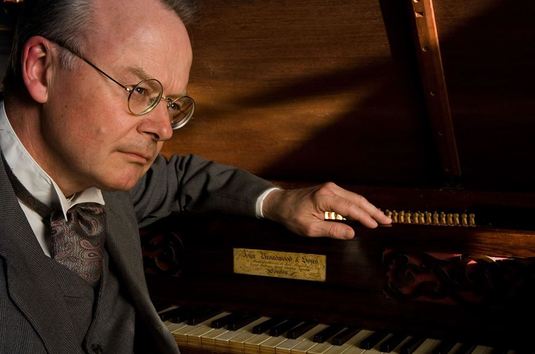David Owen Norris
|
|
Why does Mendelssohn use the emphatic dynamic mark sf so often? – about five times more frequently than Chopin, and twice or three times as often as Schumann. And why does he use the word crescendo and the hairpin mark that means the same thing, at one and the same time? And why does he sometimes write (in Italian) ‘get louder … and louder still … and still louder … till fortissimo’, when he could just write crescendo? David Owen Norris’s answers to these questions transform how he plays Mendelssohn.
Norris believes that Mendelssohn was creating a new musical syntax, related not so much to Song, like a Mozart slow movement or a Chopin cantilena, as to Rhetorical Speech. Mendelssohn is one of few composers who could speak six languages, and his writing in the Songs without Words works like a language, but not like any existing spoken language, which is why the frequent attempts to add actual words to the pieces have always been so unsuccessful. The hidden meanings of Mendelssohn’s expression marks twist the phrase like an orator – dwelling on a thought, repeating it with new emphasis, now sketching a simile even as he speaks, now sweeping to a climax: a new way of relating music and language. To borrow a phrase from Charles Lamb’s Essay, Dream Children (1823): ‘ …without speech, [they] strangely impressed upon me the effects of speech.’ In this connexion, it’s interesting to consider the crucial sentence of Steven Pinker’s book, The Language Instinct (1995): ‘People do not think in English or Chinese or Apache: they think in a language of thought’ (page 81). Perhaps Mendelssohn’s musical syntax could tap this universal Chomskyian grammar, once we’ve learned how to listen to it. David Owen Norris is a pianist, broadcaster and composer. His oratorio Prayerbook will appear in November on CD. The Sunday Times said, “Sign this man up for a series” after his celebrated deconstruction of ‘Jerusalem’ in the Prince of Wales’s television programme about Sir Hubert Parry. His work as a concert pianist has taken him round the world for forty years – “Quite possibly the most interesting pianist in the world!” said the Toronto Globe & Mail. His latest piano solo CD received a double-five-star review in BBC Music Magazine. He is currently working on an app for iPad on Beethoven’s Ninth Symphony. He was Organ Scholar at Keble College, Oxford, leaving with a First in Music and a Composition Scholarship to study at the Royal Academy of Music, where he won the Dove Prize, and privately in Paris. He was a repetiteur at the Royal Opera House, harpist at the Royal Shakespeare Company, Artistic Director of the Petworth Festival & the Cardiff International Festival, Gresham Professor of Music, and Chairman of the Steans Institute for Singers at the Ravinia Festival in Chicago. He’s a Fellow of the Royal Academy of Music and the Royal College of Organists, and an Honorary Fellow of Keble College, Oxford. Non-member admission charge for this concert - £14.
Free admission for young people. The Club is aided by the CAVATINA Chamber Music Trust and is pleased to offer free admission to young people aged 8 to 25 years of age. Children must be accompanied by an adult. The Radlett Centre at 1 Aldenham Avenue, Radlett, WD7 8HL is in the centre of Radlett with free evening parking nearby. Box Office: 01923 859291. Online booking: Purchase.Tickets.com (Radlett Centre) |

